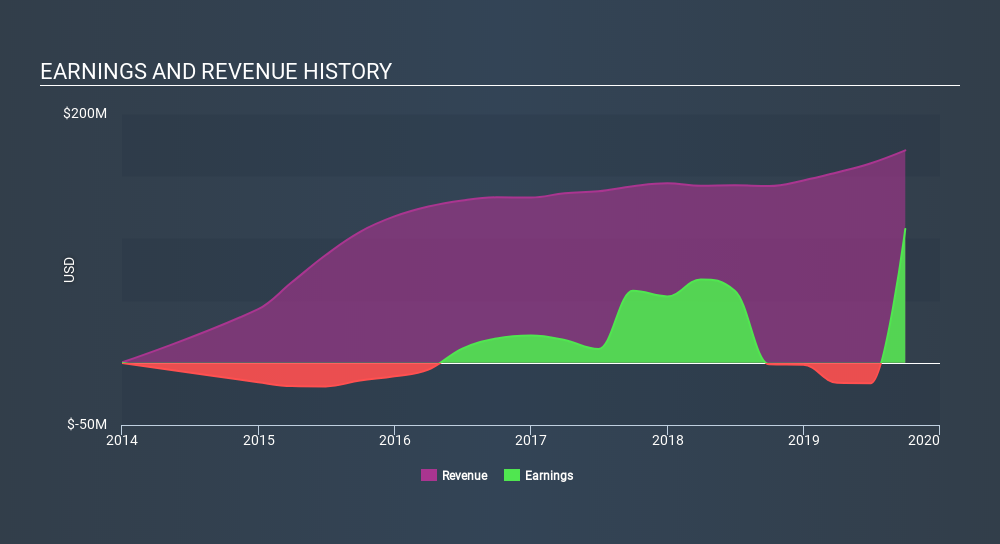- United States
- /
- Residential REITs
- /
- NYSE:NXRT
What Kind Of Shareholder Owns Most NexPoint Residential Trust, Inc. (NYSE:NXRT) Stock?

Every investor in NexPoint Residential Trust, Inc. (NYSE:NXRT) should be aware of the most powerful shareholder groups. Generally speaking, as a company grows, institutions will increase their ownership. Conversely, insiders often decrease their ownership over time. I quite like to see at least a little bit of insider ownership. As Charlie Munger said 'Show me the incentive and I will show you the outcome.
NexPoint Residential Trust has a market capitalization of US$1.3b, so we would expect some institutional investors to have noticed the stock. In the chart below, we can see that institutions are noticeable on the share registry. Let's take a closer look to see what the different types of shareholder can tell us about NexPoint Residential Trust.
See our latest analysis for NexPoint Residential Trust

What Does The Institutional Ownership Tell Us About NexPoint Residential Trust?
Institutional investors commonly compare their own returns to the returns of a commonly followed index. So they generally do consider buying larger companies that are included in the relevant benchmark index.
As you can see, institutional investors own 65% of NexPoint Residential Trust. This can indicate that the company has a certain degree of credibility in the investment community. However, it is best to be wary of relying on the supposed validation that comes with institutional investors. They too, get it wrong sometimes. If multiple institutions change their view on a stock at the same time, you could see the share price drop fast. It's therefore worth looking at NexPoint Residential Trust's earnings history, below. Of course, the future is what really matters.

Investors should note that institutions actually own more than half the company, so they can collectively wield significant power. It would appear that 9.2% of NexPoint Residential Trust shares are controlled by hedge funds. That catches my attention because hedge funds sometimes try to influence management, or bring about changes that will create near term value for shareholders. BlackRock, Inc. is currently the company's largest shareholder with 10% of shares outstanding. The second largest shareholder with 9.3%, is Highland Capital Management, L.P., followed by Wellington Management Group LLP, with an ownership of 9.0%.
We also observed that the top 6 shareholders account for 51% of the register, with a few smaller shareholders to balance the interests of the larger ones to a certain extent.
While it makes sense to study institutional ownership data for a company, it also makes sense to study analyst sentiments to know which way the wind is blowing. There are a reasonable number of analysts covering the stock, so it might be useful to find out their aggregate view on the future.
Insider Ownership Of NexPoint Residential Trust
The definition of company insiders can be subjective, and does vary between jurisdictions. Our data reflects individual insiders, capturing board members at the very least. Management ultimately answers to the board. However, it is not uncommon for managers to be executive board members, especially if they are a founder or the CEO.
I generally consider insider ownership to be a good thing. However, on some occasions it makes it more difficult for other shareholders to hold the board accountable for decisions.
It seems insiders own a significant proportion of NexPoint Residential Trust, Inc.. It has a market capitalization of just US$1.3b, and insiders have US$129m worth of shares in their own names. That's quite significant. It is good to see this level of investment. You can check here to see if those insiders have been buying recently.
General Public Ownership
With a 15% ownership, the general public have some degree of sway over NXRT. While this group can't necessarily call the shots, it can certainly have a real influence on how the company is run.
Next Steps:
It's always worth thinking about the different groups who own shares in a company. But to understand NexPoint Residential Trust better, we need to consider many other factors. To that end, you should learn about the 4 warning signs we've spotted with NexPoint Residential Trust (including 1 which is can't be ignored) .
Ultimately the future is most important. You can access this free report on analyst forecasts for the company.
NB: Figures in this article are calculated using data from the last twelve months, which refer to the 12-month period ending on the last date of the month the financial statement is dated. This may not be consistent with full year annual report figures.
If you spot an error that warrants correction, please contact the editor at editorial-team@simplywallst.com. This article by Simply Wall St is general in nature. It does not constitute a recommendation to buy or sell any stock, and does not take account of your objectives, or your financial situation. Simply Wall St has no position in the stocks mentioned.
We aim to bring you long-term focused research analysis driven by fundamental data. Note that our analysis may not factor in the latest price-sensitive company announcements or qualitative material. Thank you for reading.
About NYSE:NXRT
NexPoint Residential Trust
NexPoint Residential Trust is a publicly traded REIT, with its shares listed on the New York Stock Exchange under the symbol "NXRT," primarily focused on acquiring, owning and operating well-located middle-income multifamily properties with "value-add" potential in large cities and suburban submarkets of large cities, primarily in the Southeastern and Southwestern United States.
Established dividend payer and good value.
Similar Companies
Market Insights
Community Narratives



